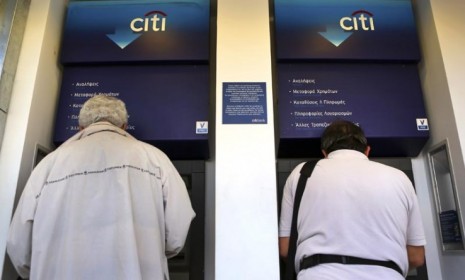Bank panic in Greece: What happens if Greeks quit the euro?
As Greece veers toward a eurozone exit, depositors are draining their bank accounts, and European leaders are beginning to plan for a post-Greece future

Greece's inconclusive elections in early May, which produced a splintered field that could not cobble together a government, have thrust the debt-ravaged country into deeper chaos. New elections are expected on June 17, but few predict they'll yield a stable coalition willing to carry out the EU-demanded austerity measures needed to keep Greece in the euro currency bloc. Since the election, panicked depositors have withdrawn 3 billion euros ($3.8 billion) from their checking accounts, and as much as 800 million euros on a single day earlier this week. Meanwhile, the European Central Bank (ECB) says it will no longer lend to certain Greek banks, a signal that the ECB is limiting its exposure to Greek risk. As Greece approaches the precipice of a euro exit, many around the world are wondering what would happen if Greece actually takes the plunge. Here, six predictions on how a euro exit would play out:
1. Greece would revert to its old currency
Greece would almost certainly re-adopt the drachma, converting all euro-denominated bank accounts, domestic debts, mortgages and other contracts, and prices of goods at a one-to-one ratio, says Gabriele Steinhauser at The Wall Street Journal. The process of actually printing new notes and coins, and disseminating them to the public, could take as long as four months, and in the interim, electronic payments or a temporary currency could be used.
The Week
Escape your echo chamber. Get the facts behind the news, plus analysis from multiple perspectives.

Sign up for The Week's Free Newsletters
From our morning news briefing to a weekly Good News Newsletter, get the best of The Week delivered directly to your inbox.
From our morning news briefing to a weekly Good News Newsletter, get the best of The Week delivered directly to your inbox.
2. The drachma could really help Greek businesses...
The Greek drachma would likely plunge in value on the currency market, says Steinhauser. And that would actually benefit many Greek businesses, since Greece's exports would suddenly be cheaper and more competitive than those of European rivals.
3. ...But devastate ordinary Greeks
Meanwhile, citizens would be left with a weak currency and higher prices for oil and other imported goods. Plus, debts to foreign businesses, denominated in euros, would be even harder to pay back, and "bankruptcies would cascade through the system," says Clive Crook at Bloomberg. The drachma's weakness could also lead, "in the worse case, to hyperinflation."
A free daily email with the biggest news stories of the day – and the best features from TheWeek.com
4. Europe might be immune to Greece's exit…
"Many experts believe an eventual departure of Greece from the eurozone is already priced into stocks, bonds, and currencies," says Paul R. La Monica at CNN. This theory holds that the crisis has been dragging on since early 2010, and global investors have already written Greece off. For them, it's always been a question of when, not if, Greece will exit.
5. ...Or the European Union could fall apart
The real danger posed by Greece's exit is a loss of confidence in other debt-embattled countries, says Crook. If the borrowing costs of Portugal, Spain, and Italy shoot up, then they, too, could leave the euro. And "if the euro falls apart, the unraveling of the European Union — again unthinkable, until now — becomes distinctly possible."
6. And losses could spread across the globe
No one is really sure how much global banks and governments are exposed to Greek debt. "Many of Greece's bad debts have already been socialized" by the ECB and the IMF during Greece's bailout, says Timothy Garton Ash at Britain's The Guardian. So if Greece defaults, Germany and other European nations that hold Greek bonds "would end up footing part of the bill." And remember, it was only a week ago that JPMorgan Chase revealed a billion-dollar loss on bad bets involving European debt, says La Monica. The worldwide cost of a messy Greece exit could climb as high as $1 trillion.
-
 The world’s oldest rock art reveals hints about human migration
The world’s oldest rock art reveals hints about human migrationUnder the Radar The art is believed to be over 67,000 years old
-
 Dive right into these 8 underwater adventures
Dive right into these 8 underwater adventuresThe Week Recommends It’s time to make a splash
-
 Grok in the crosshairs as EU launches deepfake porn probe
Grok in the crosshairs as EU launches deepfake porn probeIN THE SPOTLIGHT The European Union has officially begun investigating Elon Musk’s proprietary AI, as regulators zero in on Grok’s porn problem and its impact continent-wide